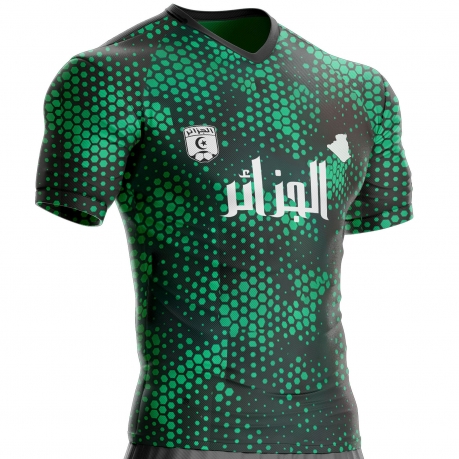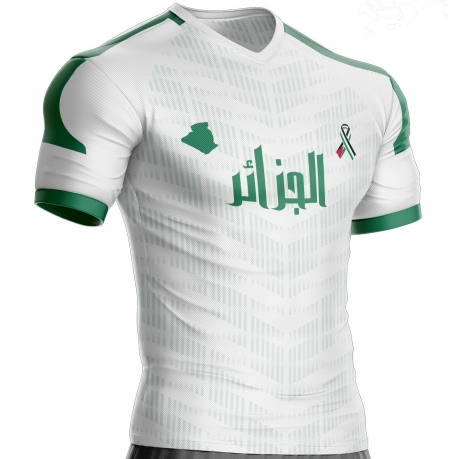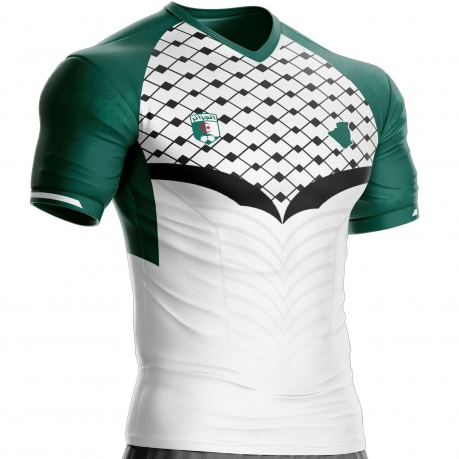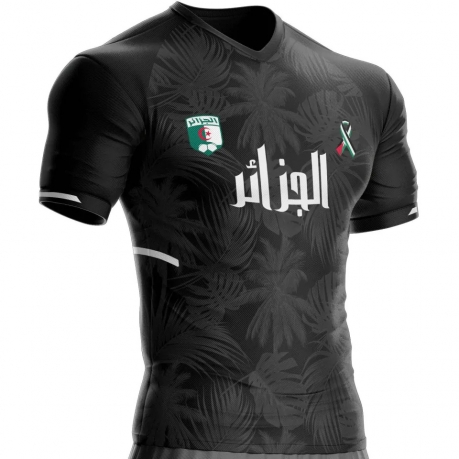The history of Algerian football: A round ball and a struggle for identity
Algerian football: A round ball and a struggle for identity
On July 5, 1982, the Benito Villamarín stadium in Seville was transformed into a volcano of joy and emotion. Algeria, a young independent nation of only 20 years old, has just achieved the feat of beating West Germany, one of the best teams in the world, at the World Cup. That day, the Fennecs, as the Algerian national team is nicknamed, did not just win a football match. They inscribe their history in legend and mark the advent of a strong and proud national identity.
Far from flamboyant stadiums and resounding exploits, the history of Algerian football is closely linked to that of Algeria itself. Born in the 1890s under the shadow of French colonialism, the practice of football quickly took on a much deeper dimension than that of a simple sport. Football has become a symbol of resistance, a vector of identity affirmation and a mobilization tool for the Algerian people in their fight for independence.
This long article aims to retrace the fascinating history of Algerian football. From its humble beginnings to its current status as a source of national pride, we will explore how the sport has transcended its initial role to become a central part of Algerian culture and identity.
By traveling through the different eras, we will discover the emblematic figures who have marked Algerian football, the moments of glory and tragedy which have marked its history, and the challenges that this sport continues to face today. Beyond the simple sporting story, we will explore the deep links that exist between football and Algerian society, and how this sport has contributed to forging the identity of a nation.
1. The beginnings of football in Algeria (1894-1930)
Football appeared in Algeria at the end of the 19th century, imported by French colonists. It was in the large coastal cities, such as Algiers, Oran and Bône, that the first football clubs emerged. These clubs were, at the time, reserved for Europeans, and Algerians were not admitted.
Despite the official exclusion, football quickly gained popularity among the Algerian population. Unofficial teams, made up of talented Algerian players, have been formed all over the country. These teams played friendly matches against each other, often in precarious conditions, and fueled the growing passion for football within the Algerian community.
Among the Algerian players of this era, we can cite the legendary figure of Mohamed Boumezrag. Nicknamed "El-Hadj", he was a talented striker who left his mark on the history of Algerian football. Boumezrag played for USM Alger, a club founded by Algerians in 1933, and was one of the first Algerian players to stand out for his talent and technique.
The period from 1894 to 1930 was a crucial period for the development of football in Algeria. Although the sport was still largely dominated by European settlers, the emergence of Algerian talent and the creation of unofficial teams laid the foundations for future emancipation and appropriation of football by the Algerian population.
Important points to remember:
-
Football arrived in Algeria at the end of the 19th century, imported by French colonists.
-
The first football clubs were reserved for Europeans.
-
Unofficial teams composed of Algerian players are formed.
-
Mohamed Boumezrag, legendary figure of Algerian football, emerged at this time.
-
This period lays the foundations for a future appropriation of football by the Algerian population.
Questions to explore:
-
What were the conditions for playing football for Algerians at that time ?
-
How did football contribute to the construction of an emerging Algerian identity ?
-
What were the obstacles and challenges that Algerian players faced ?
2. Football during the colonial period (1930-1954)
The French colonial period in Algeria, from 1930 to 1954, was marked by a significant evolution of football. The sport has experienced gradual development among the Algerian population, with the creation of football sections in multi-sport clubs and only Algerian clubs.
Development of football among Algerians:
During this period, several factors contributed to the growth of football among Algerians. Growing urbanization and improved infrastructure have allowed the creation of football fields and the multiplication of competitions. In addition, the emergence of an Algerian middle class has favored access to sport and the creation of clubs.
Creation of football clubs and sections:
Football sections have been created within already existing multi-sport clubs, such as USM Alger and MC Alger. At the same time, exclusively Algerian clubs emerged, like NA Hussein Dey and CR Belouizdad. These clubs played a crucial role in the affirmation of identity and the emancipation of Algerian football.
Talented Players Dilemma:
The development of football has also posed a dilemma for talented Algerian players. They were faced with a difficult choice: play for French teams, which offered better sporting opportunities, or play in Algerian clubs and participate in the construction of their own footballing identity.
First elements of contestation and affirmation of identity:
Football has become a ground for expression and contestation of colonial domination. Incidents punctuated matches between Algerian and French teams, symbolizing the refusal of submission and the desire to assert identity. Algerian players have also marked their political commitment by joining the nationalist movement.
Important points to remember:
-
Progressive development of football among the Algerian population.
-
Creation of football sections in multi-sport clubs and only Algerian clubs.
-
Talented players' dilemma: playing for French or Algerian teams.
-
Football becomes a ground for expression and contestation of colonial domination.
Questions to explore:
-
What was the impact of the creation of only Algerian clubs on the development of football and national identity ?
-
How did Algerian players use football to express their political commitment ?
-
What were the significant moments of protest and affirmation of identity through football during this period ?
Example of a notable moment:
In 1953, during a friendly match between USM Alger and RC Lens, the Algerian players refused to shake hands with the French players before the match. This symbolic act caused great emotion and was interpreted as a gesture of defiance towards the colonial authority.
3. Football, weapon of the struggle for independence (1954-1962)
In 1954, the outbreak of the Algerian War of Independence gave football a new dimension. Sport has become a propaganda and mobilization tool for the National Liberation Front (FLN). In 1957, the FLN team was created with the aim of bringing the voice of Algerian independence to the international stage.
Creation and objectives of the FLN team:
The FLN team was made up of talented players, selected from among the best Algerian footballers playing in France and Algeria. The team was not affiliated with FIFA and therefore could not participate in official international competitions. However, it organized a series of friendly matches around the world, drawing attention to the Algerian cause and garnering widespread international support.
Media impact of matches:
The FLN team's matches were real political events. They were followed by thousands of people in the stadiums and attracted the attention of media around the world. The team's victories were celebrated as symbolic victories against colonial oppression.
The sacrifice of the players:
The fight for independence did not spare the FLN team. Some players were forced to flee the country to escape French repression. Others were imprisoned, tortured or even killed in combat. They became “martyrs of liberation”, symbolic figures of sacrifice for the homeland.
Important points to remember:
-
Creation of the FLN team in 1957 to carry the voice of Algerian independence.
-
Organization of friendly matches around the world to raise awareness of the Algerian cause.
-
Significant media impact of the matches and increased international support.
-
Sacrifice of certain players, who became “martyrs of liberation”.
Questions to explore:
-
How did the FLN team contribute to the mobilization of the Algerian people for independence ?
-
What were the most notable moments in the history of the FLN team ?
-
What is the place of “martyr” players in Algerian collective memory ?
Example of a notable moment:
In 1958, the FLN team beat the France B team by 2 to 1 in Tunis. This victory was a source of immense pride for the Algerian people and helped strengthen their support for the independence movement.
Football played an important role in the struggle for Algerian independence. The FLN team was a symbol of resistance and hope for the Algerian people. His story continues to inspire future generations and mark the collective memory of Algeria.
4. Post-independence: construction of a national football identity (1962-1980s)
Algeria's independence in 1962 marked a new chapter for Algerian football. The official national team was created in 1963, heir to the FLN team. This new team had the difficult task of representing Algeria on the international scene and building its own national football identity.
Creation of the national team and first steps:
The Algerian national team made its official debut in 1963 in a friendly match against Tunisia. The team's first steps on the international scene were not easy. The young team lacked experience and financial means. Additionally, it was not yet affiliated with FIFA, which limited its participation in international competitions.
Difficulties and search for an identity:
The Algerian national team encountered many difficulties during the 1960s and 1970s. It suffered heavy defeats and failed to qualify for major international competitions. This situation led to some frustration among the public and criticism towards Algerian football leaders.
First participations in the CAN:
Despite the difficulties, the Algerian national team began to make progress in the 1970s. It first participated in the African Cup of Nations (CAN) in 1980. Algeria did not win the competition, but she performed well and earned the respect of her opponents.
Important points to remember:
-
Creation of the official Algerian national team in 1963.
-
Difficult start on the international scene.
-
Lack of experience and financial means.
-
Search for a clean gaming identity.
-
First participations in the CAN in the 1980s.
Questions to explore:
-
What were the main challenges faced by the Algerian national team after independence ?
-
How has the national team contributed to the construction of a national identity ?
-
What was the role of supporters in the development of Algerian football during this period ?
Example of a notable moment:
In 1980, Algeria reached the CAN final for the first time in its history. The team lost to Nigeria, but this performance marked a turning point in the development of Algerian football and gave hope for the future.
Post-independence was a period of construction and search for identity for Algerian football. The national team has struggled, but has also made significant progress. Participation in the CAN allowed Algeria to make itself known on the international scene and lay the foundations for its future success.
5. The emergence of Fennecs and the quest for international recognition (1980s-2010s)
The 1980s and 1990s were a period of glory for Algerian football. The national team, nicknamed the Fennecs, has experienced a spectacular development and acquired international recognition thanks to the emergence of great players and convincing results on the continental and world stage.
Emergence of great players and improvement in the level of play:
The emergence of the Fennecs was accompanied by the emergence of great talented players. Among the most notable figures, we can cite Lakhdar Belloumi, Rabah Madjer, Djamel Menad and Salah Assad. These players brought a new dimension to Algerian football with their technique, creativity and fighting spirit.
Historic qualification for the 1982 World Cup:
One of the most notable moments of this period was Algeria's historic qualification for the 1982 World Cup in Spain. The Fennecs achieved a resounding feat by beating West Germany, one of the best teams in the world, in the group stage. This performance propelled Algeria to the forefront of the international scene and left its mark on a generation of supporters.
Victory in the 1990 African Cup of Nations:
The supreme consecration arrived in 1990 with Algeria's victory in the African Cup of Nations. This first continental victory was the culmination of a long period of work and sacrifice. It also marked the peak of a golden generation of players who left their mark on the history of Algerian football.
More unstable period:
After the辉煌时期, the 2000s and 2010s were a more unstable period for the national team. Algeria has experienced ups and downs on a sporting level, with qualifications for the World Cup in 2010 and 2014, but also failures during certain CANs.
Important points to remember:
-
Emergence of great Algerian players in the 1980s and 1990s.
-
Historic qualification for the 1982 World Cup.
-
Victory in the 1990 African Cup of Nations.
-
More unstable period after 2000, with mixed results.
Questions to explore:
-
What were the factors that contributed to the emergence of Fennecs in the 1980s and 1990s ?
-
What is the impact of the golden generation of 1990 on Algerian football today ?
-
What are the challenges that the Algerian national team must overcome to regain its former glory ?
The emergence of the Fennecs in the 1980s and 1990s marked a prosperous period for Algerian football. The golden generation of this era gave the country unforgettable moments of glory and contributed to the international recognition of Algerian football. The national team continues to write its history and carry the hopes of a passionate people.
Example of a notable moment:
Algeria's victory in the 1990 CAN final against Nigeria remains one of the most memorable moments in the history of Algerian football. Lakhdar Belloumi's goal in extra time gave the country its first continental title and sparked an explosion of joy across the country.
Note:
The term "golden generation" is often used to describe the Algerian national team of the late 1980s and early 1990s. This generation won the 1990 CAN and participated in the 1982 and 1986 World Cup.
6. Algerian football today: challenges and ambitions (years 2010-present)
Algerian football continues to occupy an important place in Algerian society. The national team remains a source of pride and national unity, capable of bringing people together around a common passion.
The national team: a source of pride and national unity:
Despite a period of instability following the golden generation of the 1990s, the Algerian national team has enjoyed a resurgence in form in recent years. She notably participated in the 2014 and 2010 World Cup, and won the African Cup of Nations in 2019. These successes helped to strengthen national pride and unite the Algerian people around their national team.
Development of infrastructure and youth training:
The Algerian authorities have invested in the development of football infrastructure and the training of young players. New stadiums were built, training centers were created and development programs were put in place. The objective is to create an environment conducive to the emergence of new talents and the improvement of the level of play of Algerian football.
National team goals:
The Algerian national team aims to qualify regularly for the World Cup and become a dominant force in African football. To achieve these objectives, it must continue to progress on a sporting level and become professional.
Challenges to overcome:
Algerian football faces several challenges. The professionalization of Algerian clubs is still underway and corruption is plaguing certain aspects of sport. It is necessary to address these challenges so that Algerian football can continue to develop and reach its full potential.
Important points to remember:
-
Football remains a source of pride and national unity in Algeria.
-
The national team has enjoyed a resurgence in form in recent years.
-
Efforts are being made to develop infrastructure and training for young people.
-
The national team aims to regularly qualify for the World Cup and dominate African football.
-
The professionalization of clubs and the fight against corruption are important challenges to overcome.
Questions to explore:
-
What are the main strengths and weaknesses of Algerian football today ?
-
What is the role of football in Algerian society ?
-
What are the ways to professionalize Algerian clubs and fight against corruption ?
Example of a notable moment:
Algeria's victory in the CAN 2019 final against Senegal was a moment of immense joy for the Algerian people. This victory confirmed Algeria's status as one of the best teams in Africa and gave hope for the future of Algerian football.
Algerian football is at a crossroads. The development of infrastructure and youth training, as well as the professionalization of clubs and the fight against corruption, are essential conditions for Algerian football to continue to progress and achieve its ambitions. The future of Algerian football is bright, and the Algerian people are eager to see their national team shine on the international stage.
Algerian football has had a rich and eventful history, closely linked to the evolution of the country since the colonial period. Sport has played an important social and political role, contributing to the affirmation of national identity and the mobilization of the Algerian people.
Summary of the history of Algerian football:
Football was introduced to Algeria by French settlers at the end of the 19th century. Initially, it was reserved for Europeans, but it quickly gained popularity among the Algerian population. Unofficial teams were formed and football became a symbol of resistance and hope for the Algerian people.
After independence in 1962, the national team was created and brought Algeria's voice to the international stage. The golden generation of the 1980s and 1990s marked the history of Algerian football with unforgettable moments of glory, such as victory in the African Cup of Nations in 1990.
Today, football remains a source of pride and national unity in Algeria. The national team aims to qualify regularly for the World Cup and become a dominant force in African football.
Social and political role of football:
Football has played an important social role in Algeria by promoting social cohesion and living together. It was also a tool of political mobilization, used by the nationalist movement to challenge colonial domination.
Football as a mirror of the evolution of Algeria:
The history of Algerian football reflects the evolution of the country since the colonial period. Sport has been a witness to the struggles and aspirations of the Algerian people. He also contributed to the construction of a national identity and the promotion of Algerian culture.
Looking to the future of Algerian football:
The future of Algerian football is promising. The development of infrastructure and youth training, as well as the professionalization of clubs and the fight against corruption, are essential conditions for Algerian football to continue to progress and achieve its ambitions.
The Algerian people are impatient to see their national team shine on the international stage and achieve new exploits. Algerian football has the potential to become a major force in world football and to carry the colors of Algeria high on the international stage.
Important points to remember:
-
Football has a rich and eventful history in Algeria.
-
He played an important social and political role.
-
It is a mirror of the evolution of Algeria since the colonial period.
-
The future of Algerian football is promising.
Questions to explore:
-
What are the main challenges that Algerian football must meet to achieve its ambitions ?
-
What is the role of football in promoting Algerian culture ?
-
How can football contribute to the social and economic development of Algeria ?
Football is more than just a sport in Algeria. It is a national passion, a symbol of unity and hope, and a mirror of the country's evolution. The future of Algerian football is bright and the Algerian people are eager to see their national team achieve new feats on the international stage.










